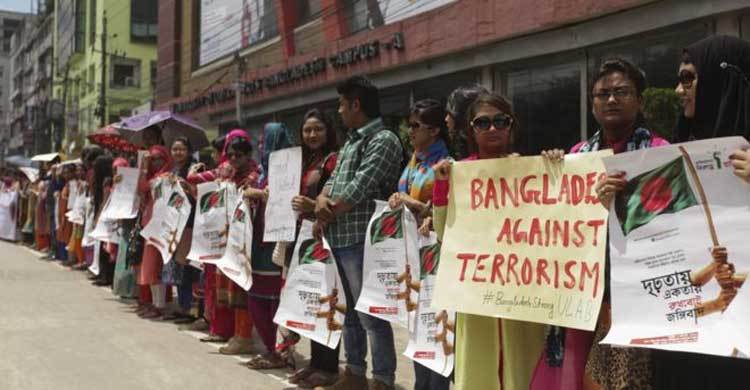Why are Bangladeshi students turning to extremism?

More than 20 people, mostly foreigners, were killed in a brazen Islamist attack on a cafe in the Bangladeshi capital, Dhaka, on 1 July. The five young gunmen were shot dead by the army.
Many in the country were shocked to learn that some of the militants came from wealthy families and were educated in elite educational institutions.
Since then, life in Bangladeshi universities has changed dramatically. The BBC’s Ethirajan Anbarasan has been speaking with university students and activists in Dhaka about youth radicalisation.
Suvro Emmanuel Rozario, Dhaka University - ‘We have lost connection with our families’
Until recently, Bangladesh had a culture of living [closely] together, there were strong family ties, and people were living with their family members, and they were communicating with them.
Suddenly, we had more connection with the world through the internet and social media - [but] we lost connection with our families.
We are being isolated either with a computer or a smartphone.
This is where the extremists take the opportunity.
The vulnerable youth are isolated, and they cannot share their despair or frustration with others.
The extremists exploit frustration of these youths and isolate them from their families.
If you look at those extremists who were involved in recent attacks, they were living isolated from their families.
There is no space to share their emotions.
Until recently, Bangladesh had a culture of living [closely] together, there were strong family ties, and people were living with their family members, and they were communicating with them.
Muntaka Khan, student activist – ‘We need more activities and more inclusion’
The latest violent incidents have definitely created a bit of misunderstanding among people on what the youth should do or what they actually think.
At the same time, they have also created a bit of awareness, in the sense that now people are more concerned about what activities the youth are getting involved in and how they are using their free time, because that is very important.
Some of these students involved in extremist activities [came from] reputed universities.
They were definitely studying, but, besides that, probably what happened was [that] they did not have other things to [keep themselves occupied] with, which forced them to do something which was unconventional, which was not normal, which made them go into extremist ways or to get radicalised.
That’s the discussion that we are actually going through right now, how can we make the youths more active, or create more inclusion among ourselves so that these sorts of distractions do [not tempt them]?
Mashahed Hassan Simanta, Jahangir Nagar University – ‘The lonely are being targeted’
The extremists try to find those who are lonely and frustrated.
Those people are easy to manipulate.
In order to fulfil their own purpose, [the extremists] need to inject [their] ideologies into those people.
We need to be more concerned about what our [fellow] students and friends are actually doing.
Ritun Mubtasin Kabir, Jahangir Nagar University – ‘I knew they were trying to brainwash me’
Most of the frustrated youth do not have an icon or a role model who they can follow and who can mentor them.
Having a role model is important because then [one] can have a goal in life.
We can try to emulate that person.
Our life should always have a purpose, what [we] really want to be.
When I was in school, there was a student organisation linked to an Islamist party.
They came to me and only said that they prayed five times a day.
I knew that they were trying to brainwash me.
Unfortunately, lots of my friends did not have that kind of awareness.
Those people can be easily manipulated.
Most youths are aware of those who are trying to propagate extreme views, but only three or four students can get misled and this minority can do horrible things like the Gulshan attack.
Farah Zein Nikita, Dhaka University – ‘What we are seeing is the opposite of Islam’
I think what is happening in Bangladesh is misrepresentation and miscommunication about Islam and about religion.
We know that Islam is a religion of peace.
But what we are seeing is the opposite of Islam.
We are a secular country, and we all live together.
Muslims, Hindus and Buddhists live together.
We celebrate all festivals together.
Some of our youths get frustrated about religion and get frustrated about everything.
This is a dark hour in our country, but it will pass very soon.
Rehan Khondekar, Dhaka University – ‘Young people need to connect with each other offline’
After the Gulshan attack, I think that the youth community should be more connected.
They should go and discuss their issues and inner feelings with their families and friends offline.
We think that we have a separate world on social media like Facebook.
But, actually, we are alone there.
When we meet face to face, we get to know each other and we understand each other’s values.
The main problem here is the youth are not getting the right information from the right people.
In our country, what we can do is to use our imams in mosques.
They can spread good values to our youth more frequently during prayers.
We [also] have to make sure that this right information is online.


